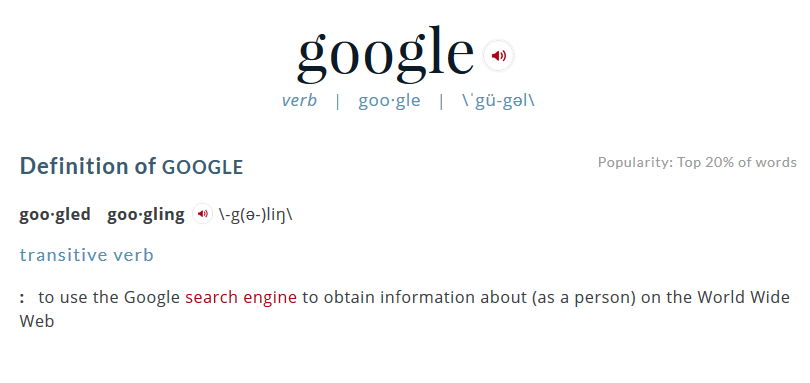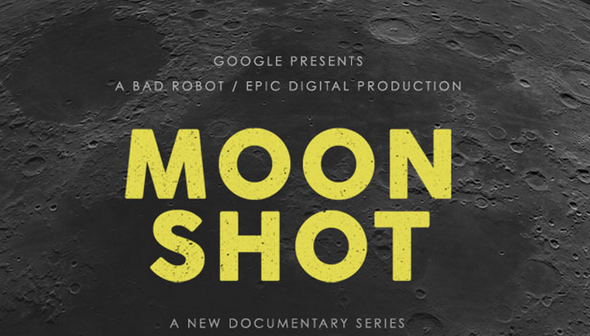
Image Source: Pexels.com
Can you imagine your life without Google? Perhaps you can, perhaps you can’t. And perhaps it depends on whether you were born before or after Google was introduced to the world. Nonetheless, the truth is we use the search monopolist (and its products) without giving it a second thought.
Why? Because Google helps us in our work whenever we want to learn quickly how to do something; because Google assists us in our daily lives when we plan our next vacation or when we need to know how to get somewhere.
(There’s a reason) We use Google whenever we need to acquire information quickly and adeptly.
We are so used to the search giant that we ‘google’ everything instead of looking it up online (it’s the same thing, eh?) or doing it the old-fashioned way by visiting the local library. Google is our library. Google is a synonym to ‘search’ and one of the most popular modern verbs, already included in dictionaries.

Image Source: https://www.merriam-webster.com
The statistics prove it. As of March 2016, Google has the largest desktop market share with 67.78% (data by NetMarketShare.com), followed by Bing, Baidu, Yahoo, AOL.
Remember when we decided to check how much Google knew about us, its dedicated users? Now it’s time to see how much we know about Google. We are googling Google, figuratively speaking. It goes without saying that there are lots of lots of curious facts to explore. However, some are more outstanding than others, and those are the facts that outline the future of humankind.
We are giving you some known and other lesser known facts about the Internet giant to prove we need to ask more questions, instead of taking everything for granted.
What are the prospects of learning more about Google?
1) You get a clue of where technology is headed;
2) You deserve the right to be titled a ‘know-all’;
3) Next time you are not feeling a conversation, you can quickly change the subject to “Did you know that Googlе…?”.
If you’re not satisfied with those options, remember that Google has been around for almost 20 years. Aren’t you just a tad curious of what has happened during that lengthy period? You are, aren’t you? Let’s proceed.
Curious Facts from ’s Past
Google’s Origin
(You probably know this, but consistency requires us to start from the beginning). Google started out as a research project by Larry Page and Sergey Brin (the founders of Google) in 1996, and was originally named BackRub. Page and Brin were both Ph.D. students at Stanford University and were delving into the mathematical properties of the World Wide Web, analyzing its link structure as a huge graph. They were also friends.

Google’s first computer. Image Source: https://infolab.stanford.edu
We won’t go deeper into details about the birth of Google (for more details, go to Wikipedia’s page). But it is worth mentioning that the search engine initially used Stanford’s website with the domain google.stanford.edu. The domain google.com was registered on September 15, 1997.
Google’s First Office (and How It Lead to a Successful Career)
The first company office was a garage in Menlo Park, California, owned by Susan Wojcicki. Susan Wojcicki is the current CEO of YouTube. She was also senior vice president of Advertising & Commerce, and has worked on Google AdWords, AdSense, DoubleClick and Google Analytics. Actually, AdSense was developed by Susan Wojcicki. Susan has 5 kids. Impressive, isn’t it?
Google’s PageRank
Google’s co-founder Larry Page invented PageRank together with Brin. PageRank is Google’s search ranking algorithm. PageRank is actually named after Larry Page, not because it has something to do with web pages. Or perhaps it’s one of those great coincidences!
Here’s how PageRank works, in Google’s own words:
PageRank works by counting the number and quality of links to a page to determine a rough estimate of how important the website is. The underlying assumption is that more important websites are likely to receive more links from other websites.
Why “Google”?
Do you know what a googol is? 1 googol =1.0 × 10100. A googol is the large number 10100. The term was invented in 1920 by a nine-year-old, Milton Sirotta, nephew of American mathematician Edward Kasner.
When Larry Page and Sergey Brin were looking for a name for their project (BackRub wouldn’t do the job, obviously), they came up with the idea to use googol. They believed that googol illustrated the intention of the search engine to provide large quantities of information. However, they misspelled it while checking if such a domain already existed.
The Kasner family considered suing Google for using the googol term in 2004. However, a lawsuit was never filed.
That Time When Excite Refused to Buy Google
Excite, one of Internet’s original portals, once refused to acquire Google for less than a million dollars. The story was quite popular among IT folks few years ago but there’s a good chance you missed it.
Here’s what happened. In 1999, Brin and Page were looking to sell Google, because the project was taking up much of their time. As the story goes, the two of them arranged a meeting with George Bell, CEO of Excite at that time, and made him an offer of a million dollars. However, Bell rejected the offer. Actually, he rejected them twice. The sum was later decreased to $750,000 but Bell didn’t agree to it. We bet he’s regretting his decision now, while Brin and Page are happy they couldn’t sell!

Image Source:https://www.excite.com/
Meanwhile, Excite became Ask.com, as it was acquired by Ask Jeeves in 2004. To be more precise, Excite’s portal and services are owned by Excite Networks. However, in the USA, Excite is a personal portal, named My Excite, controlled by Mindspark and owned by IAC Search and Media. If Mindspark sounds familiar to you, it is most likely because you have been struggling to remove a Mindspark-associated unwanted home or search page from your browser.
Chances are you landed on one of our adware removal articles dedicated to products owned by Mindspark, like
FromDocToPDF(.)com or SoccerInferno.
What a small Internet we live in!
Curious Facts about ’s Present
Google’s Death Benefits
In August 2012, a story appeared on Forbes, revealing Google’s most peculiar and astounding policy towards the death of their employees, oddly but accurately referred to as ‘death benefits’.
Here’s what author Meghan Casserly found out in an interview with Chief People Officer Laszlo Bock:
Should a U.S. Googler pass away while under the employ of the 14-year old search giant, their surviving spouse or domestic partner will receive a check for 50% of their salary every year for the next decade. Even more surprising, a Google spokesperson confirms that there’s “no tenure requirement” for this benefit, meaning most of their 34 thousand Google employees qualify.
Further in the conversation, Bock explains that struggling with the death of your partners is never an easy task. That is why Google as a company has made it their mission to do their best to help the surviving spouse. In addition to the 10-year pay package, the surviving spouse will have their stocks entrusted immediately and any children will receive a monthly payment in the size of $1,000 until the age of 19, or 23 in case the child is a full-time student.
The death benefits policy was embraced by Google in 2011.
Google’s Acquisition Policy
In April 16, 2015, Google had acquired more than 180 companies, its largest acquisition being the acquisition of Motorola Mobility for $12.5 billion. Interestingly, most of the companies bought by Google are based in the United States, in or around the San Francisco Bay Area (via Wikipedia).
This means that Google has been acquiring approximately one company per week since 2010.
Google and Real-Time (Car) Traffic Tracking
We all know that Google (among other online services) collects sensitive information about its users. Data collection is a double-edged knife, to say the least. However, it can have a positive outcome. Did you know that, thanks to Android devices, Google Maps can show you the intensity of traffic in your area? Go to Google’s Support Page for more details. Or just:
- Open the Google Maps app.
- Touch the menu in the top left corner.
- Select Traffic.
In other words, the traffic flow visible on your map is a precise real-time display of the exact number of Android phones currently passing through the same route.
Curious Facts about ‘s Future (And Our Own)
Google’s Mission and Google Books Project
Did you know that Google has made it their mission “to organize the world’s information and make it universally accessible and useful”? Gathering all the world’s books at one (online) location is the perfect way to put their mission into motion.
According to Leonid Taycher, one of the software engineers working on Google Books, in 2010, there were exactly 129,864,880 books in the world. To count and digitalize all books available in the world, Google engineers have written programs that go through 150 catalogues and directories such as the International Standard Book Numbers (ISBN). The programs also serve to eliminate as many duplicate entries as possible.
As of June 2010, Google has scanned 12 million books, written in about 480 languages. Roughly estimated, Google plans to complete the scanning within a decade, which means that by 2020 the mankind will have a full virtual collection of four billion pages and two trillion words. Amazing, right?
Google’s Lunar Xprize
Have you heard of Google’s highly anticipated and ambitious Lunar Xprize project?

Created in 2007, the mission of the Google Lunar XPRIZE is to incentivize space entrepreneurs to create a new era of affordable access to the Moon and beyond. The competition’s $30 million prize purse will be awarded to teams who are able to land a privately funded rover on the moon, travel 500 meters, and transmit back high definition video and images.
If this impressed you, just imagine that “it takes about the same amount of computing to answer one Google Search query as all the computing done — in flight and on the ground — for the entire Apollo program!”
Google definitely loves science, as it also hosts a Global Science Fair – an international online competition open to individuals or teams from 13 to 18 years old.
—
After all the knowledge your mind just swallowed in and is probably still digesting, you’re most likely craving for some interaction. With Google. Just go to google.com and type in ‘askew’! Otherwise, check the traffic and if it’s okay, go out and explore the offline world. It’s as amusing as exploring it via Google Earth!


